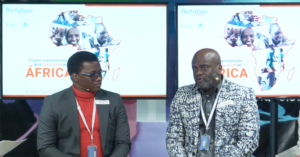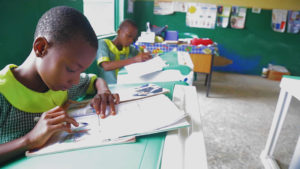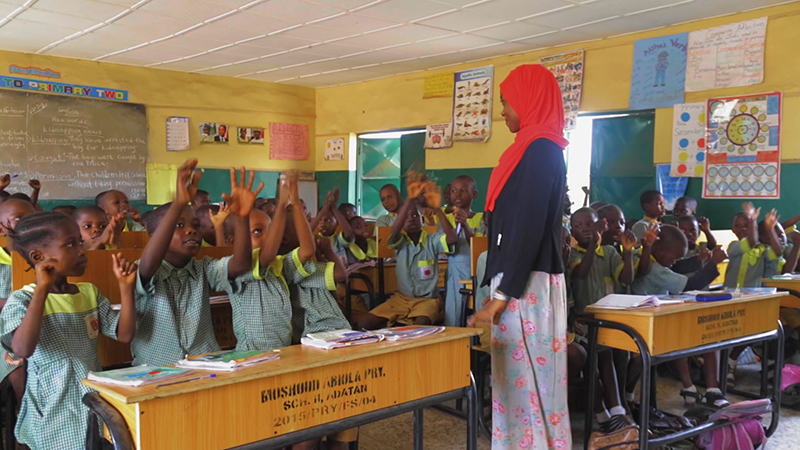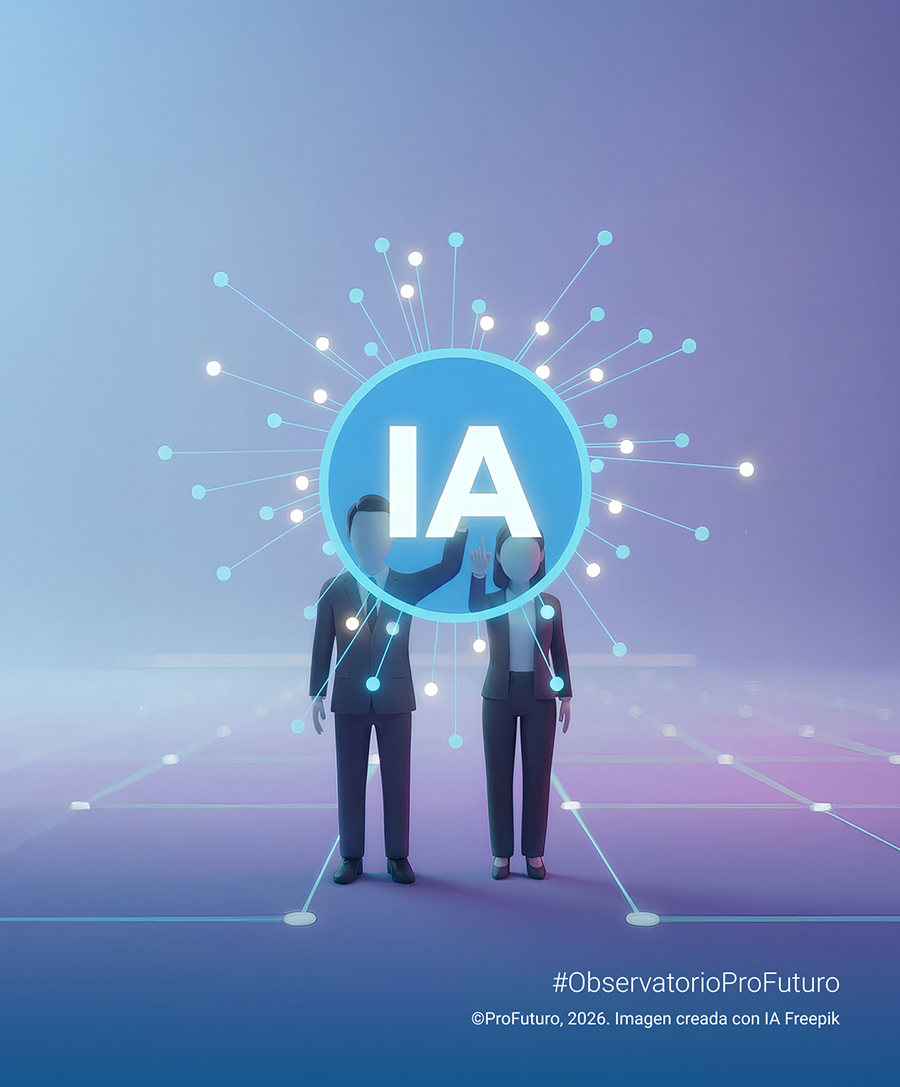The African giant and the education gap
With 211 million inhabitants, Nigeria is the most populous country in Africa and its largest geographically and economically. One in five Africans live in Nigeria. Their major economic asset is oil (3.5 per cent of world production), which they export worldwide. However, Nigeria is also a country plagued by poverty for the majority of its population, making it one of the most unequal countries in the world.
Thus, while a privileged elite flaunts its high standard of living, nearly 90 million people live in abject poverty. Nigeria has the dubious honour of topping the world rankings for out-of-school children. “The school drop-out rate and lack of access to education is higher in Nigeria than in any other country in the world”, explains the Kukah Center, a research institute based in the country. And the situation in the north (where the ProFuturo Foundation operates) is even worse, with its endemic problems of hunger and violence and where children sometimes have to walk up to 10 kilometres to school.
Against this backdrop, in 2017, the ProFuturo Foundation signed an agreement with the Kukah Center and the Northern Governors Forum to bring its digital education programme to more than 70,000 children in 120 schools in the northern part of the country, one of the most impoverished regions with endemic problems of hunger and violence. Here, 10 of the 19 states that make up the region are at the bottom of the national ranking.

Los representantes de Kukah Center en su charla en las instalaciones de ProFuturo.
How do we ensure the right to education for children living in this area of the country? Michael Ibrahim Magaji, senior advisor at the Kukah Center, and Lawson Osezuwa Eselebor, head of the ProFuturo Programme in Nigeria, give us some guidance on this and tell us first-hand what factors help a socio-educational intervention implemented with technology to succeed in its mission to help improve the educational quality of vulnerable environments.
The school dropout rate and lack of access to education is higher in Nigeria than in any other country in the world.
Involving key players in the region
In Africa they have a saying: if you want to go fast, walk alone; if you want to go far, walk with others. Thus, as representatives from the Kukah Center explain, “from the very beginning, when we were defining the scope of the project, our main objective was to involve the region’s primary stakeholders. We talked to the governors and the policy makers. We talked to other donors. We talked to sub-national governments. We also had to reach out to community leaders and school management committees, which included parents and teachers, to get their support, because unlike many other projects in Nigeria, we wanted the community to take ownership of the programme, to embrace it, to pave the way for its acceptance and adoption”. The strategy worked because, through this engagement mechanism, they were able to “penetrate the system and start implementing the programme”.
Public-private partnerships
“Partnerships are very important for the success of any educational programme”, explains the Kukah Center, whose partnership with the ProFuturo Foundation and the Northern Governance Forum is a clear example of this. In fact, they hope to generate more global and local partnerships as the project moves forward. Public-private partnerships allow us to connect the dots and get the results we want. That’s why we look for those multilateral partnerships that put the puzzle together and enrich the programme. Because there are many organisations that can contribute in different ways, from funding the equipment to promotion, to support what we do”.
Government support
Closely related to the above, for such a programme to work properly, government involvement is essential. In Nigeria, due to its political-administrative make-up, the involvement of sub-national and local governments is particularly important, as education is their responsibility and they are closer to the people and more aware of their needs. The Kukah Center believes that these local administrations can have more impact and are in a better position to inject funds, knowledge and expertise to convince their people of the virtues of embracing digital education.
In the case at hand, for example, local governments helped schools to meet the conditions required for the programme to run properly: security for the equipment, provision of electricity for charging and running the devices, etc. They also set up conditions to prevent teachers who had been trained by the programme from leaving for other places.
We look for those multilateral partnerships that fit the puzzle and enrich the program. Because there are many organizations that can contribute in different ways, from funding to equipment to promotion.
Pedagogical innovation: a contagious motivation

With a methodology that puts the student at the centre and uses learning by doing, a curriculum aligned with national educational priorities, digital devices with quality educational content that also allow teachers to upload external resources and customise their classes, and so on, all these factors combined have made students excited about school. The learning experience has gone from students just listening to a teacher for 40 minutes in class to wanting to stay in class for two hours, simply because they are playing games, doing exercises and tests on their tablets. “Their parents come looking for them and they don’t want to leave”, they say. The teachers, too, are enthusiastic, because for them it is an opportunity to perfect their knowledge and improve what they have.
The motivation of students and teachers is contagious, and the whole community sees how digital education is truly transforming children’s lives: “Enrolments have sky-rocketed because everyone wants to take their children to these schools where they learn with technology”. The Kukah Center representatives speak of schools that have doubled their sections from one per grade to two, and other schools, on the verge of closing, that now have so many students that they can even generate income to pay their teachers better.
Activism to bridge the gender gap
Gender discrimination in Nigeria is a serious social problem that carries over into schools, where the number of female students is very low compared to their male counterparts. It is a problem rooted in the culture and traditional values of families who do not see a “return on investment” by sending their daughters to school because they often marry them off at the age of 10 or 12 without their consent. So one must ‘advocate’, lobby and try to convince families and communities how important it is for girls to go to school. Girls must be empowered. It also helps a great deal to have women teachers mentoring girls and teaching families that schools are also places for women.
Sustainability: far beyond hardware
Constant accompaniment is one of the defining characteristics of the Kukah Center and ProFuturo project. Unlike others, which simply hand out devices or software, ProFuturo’s programme trains teachers, trains students, regularly engages with education authorities, and more. All this, is combined with sound strategic planning, the active participation and support of community stakeholders, and the integration of the programme into the educational and legal context of the country, helps the project to endure over time and achieve its long-term objectives.
This experience has shown how the combination of all these key elements can make a difference in improving education and reducing the education gap in Nigeria and other countries with similar challenges.






